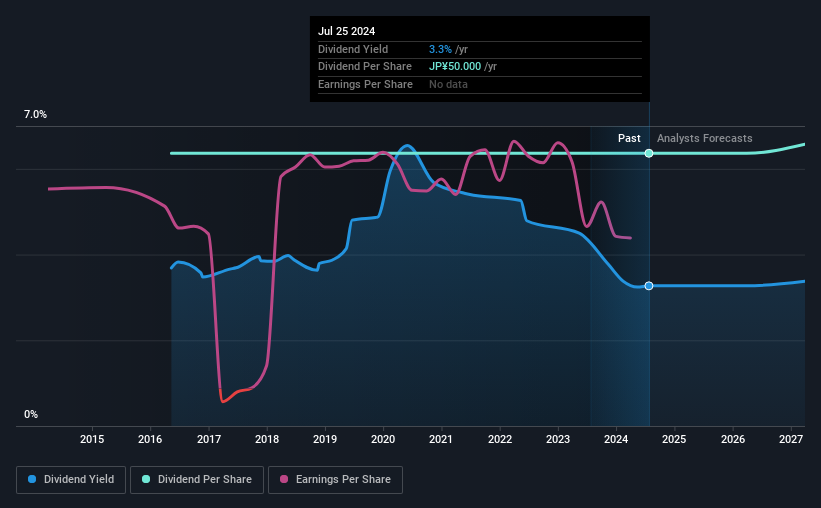Japan Post Holdings (TSE:6178) Has Announced A Dividend Of ¥25.00

The board of Japan Post Holdings Co., Ltd. (TSE:6178) has announced that it will pay a dividend of ¥25.00 per share on the 5th of December. This means the dividend yield will be fairly typical at 3.3%.
See our latest analysis for Japan Post Holdings
Japan Post Holdings' Dividend Is Well Covered By Earnings
We like to see a healthy dividend yield, but that is only helpful to us if the payment can continue. Prior to this announcement, Japan Post Holdings' earnings easily covered the dividend, but free cash flows were negative. In general, we consider cash flow to be more important than earnings, so we would be cautious about relying on the sustainability of this dividend.
Over the next year, EPS is forecast to expand by 17.6%. If the dividend continues on this path, the payout ratio could be 53% by next year, which we think can be pretty sustainable going forward.

Japan Post Holdings Doesn't Have A Long Payment History
The dividend's track record has been pretty solid, but with only 8 years of history we want to see a few more years of history before making any solid conclusions. There hasn't been much of a change in the dividend over the last 8 years. Japan Post Holdings hasn't been paying a dividend for very long, so we wouldn't get to excited about its record of growth just yet.
Dividend Growth May Be Hard To Come By
The company's investors will be pleased to have been receiving dividend income for some time. However, things aren't all that rosy. In the last five years, Japan Post Holdings' earnings per share has shrunk at approximately 6.5% per annum. If the company is making less over time, it naturally follows that it will also have to pay out less in dividends. However, the next year is actually looking up, with earnings set to rise. We would just wait until it becomes a pattern before getting too excited.
The Dividend Could Prove To Be Unreliable
Overall, it's nice to see a consistent dividend payment, but we think that longer term, the current level of payment might be unsustainable. With cash flows lacking, it is difficult to see how the company can sustain a dividend payment. We don't think Japan Post Holdings is a great stock to add to your portfolio if income is your focus.
Companies possessing a stable dividend policy will likely enjoy greater investor interest than those suffering from a more inconsistent approach. Still, investors need to consider a host of other factors, apart from dividend payments, when analysing a company. As an example, we've identified 2 warning signs for Japan Post Holdings that you should be aware of before investing. Is Japan Post Holdings not quite the opportunity you were looking for? Why not check out our selection of top dividend stocks.
New: Manage All Your Stock Portfolios in One Place
We've created the ultimate portfolio companion for stock investors, and it's free.
• Connect an unlimited number of Portfolios and see your total in one currency
• Be alerted to new Warning Signs or Risks via email or mobile
• Track the Fair Value of your stocks
Have feedback on this article? Concerned about the content? Get in touch with us directly. Alternatively, email editorial-team (at) simplywallst.com.
This article by Simply Wall St is general in nature. We provide commentary based on historical data and analyst forecasts only using an unbiased methodology and our articles are not intended to be financial advice. It does not constitute a recommendation to buy or sell any stock, and does not take account of your objectives, or your financial situation. We aim to bring you long-term focused analysis driven by fundamental data. Note that our analysis may not factor in the latest price-sensitive company announcements or qualitative material. Simply Wall St has no position in any stocks mentioned.
Have feedback on this article? Concerned about the content? Get in touch with us directly. Alternatively, email editorial-team@simplywallst.com
About TSE:6178
Japan Post Holdings
Provides postal, banking, and insurance services in Japan.
Very undervalued with proven track record.
Similar Companies
Market Insights
Community Narratives



